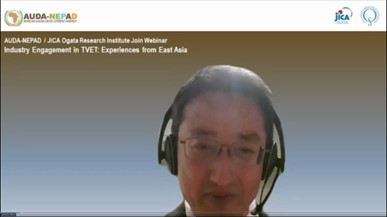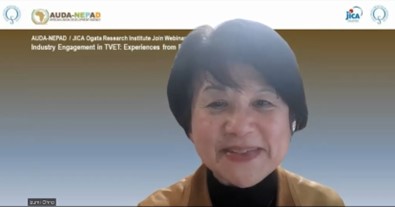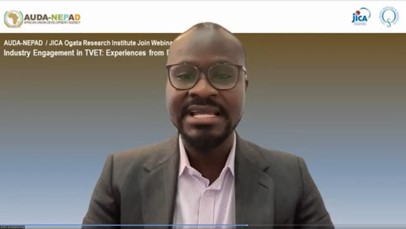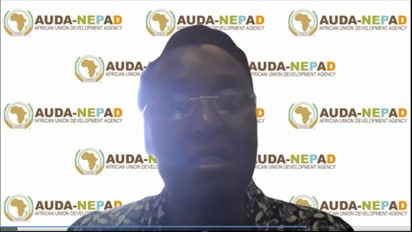Industry Engagement in Technical and Vocational Education and Training: How East Asian Countries Learned and Localized Foreign Models of Technical Education
2024.02.15
On Jan. 16, 2024, the Africa Union Development Agency (AUDA-NEPAD) Policy Bridge Tank and the JICA Ogata Sadako Research Institute for Peace and Development (JICA Ogata Research Institute) held a webinar to celebrate the publication of the book
Introducing Foreign Models for Development: Japanese Experience and Cooperation in the Age of New Technology. The key concepts of this book are translative adaptation and local learning. This webinar focused on how East Asian countries have localized foreign models of technical education so that their lessons could be utilized in other contexts, specifically that of Africa. Two of the book’s editors, Mori Juinichi, former chief technical advisor to the Skills for Prosperity Program in Malaysia, International Labour Organization (ILO), and Ohno Izumi, professor at the National Graduate Institute for Policy Studies (GRIPS) and senior research advisor, JICA Ogata Research Institute, shared some findings of the book and exchanged views with the participants.
Pamla Gopaul, Head of the Economic Analysis and Foresight Unit, AUDA-NEPAD gave the opening remarks, noting that development of industrial human resources is a crucial priority for numerous countries, particularly in Africa, where addressing youth employment is high on the agenda. She also noted that education has been designated by the African Union as the theme of the year for 2024, making this webinar a very important bridge event.
The first presenter, Mori discussed technical and vocational education and training (TVET) in the context of Vietnam, based on a case study of JICA support to the Hanoi University of Industry (HaUI). Mori pointed out that issues are not only on the supply side of human resources but also on the demand side and all need to be addressed to overcome the challenges for skills development. In Vietnam, although various policies to promote industry engagement have been initiated, policymakers and educators have struggled to involve private companies in TVET programs. Thus, JICA supported HaUI to adapt to their own needs a Japanese training management system where there is constant engagement with industry, which he described a key enabling factor for TVET. He concluded that the process as experienced by Vietnam—translative adaptation—is dynamic not static as far as the recipients of foreign models keep developing their absorptive capacity through learning with ownership.

Mori Juinichi, former chief technical advisor to the Skills for Prosperity Program in Malaysia, International Labour Organization
The second presenter, Ohno shared Thailand’s experience with technology promotion and technical education, citing two case studies of the Technology Promotion Association (TPA) and the Thai-Nichi Institute of Technology (TNI), and how Japanese-style manufacturing was learned and localized in that country’s context. Their translative adaptation process can be characterized by five-stages: technology transfer, internalization and technology promotion, technology diffusion, technology education, and overseas expansion and innovation. She identified the key factors for their successful adaptation as strong ownership, the existence of dedicated core professionals and financial autonomy on the Thai side, and multi-faceted human networks and embedded incentives on both the Thai and Japanese sides. In terms of Africa, Ohno stated that while there are many opportunities for industrial human resource development, it is important to create home-grown mechanisms by mobilizing development cooperation and those who studied abroad with the ability to take on the leadership role in technology transfer.

Ohno Izumi, professor at the National Graduate Institute for Policy Studies (GRIPS) and senior research advisor at the JICA Ogata Research Institute
Homma Toru, senior advisor to the Chief Executive Officer, AUDA-NEPAD, and senior advisor on Private Sector Development, JICA, who was the co-moderator for this webinar, highlighted some takeaways from the two presentations and stressed the need for long-lasting development, further private sector engagement, the adoption of Kaizen as a core tool for technical education, contribution to advancement of industry in the era of digitalization, and seeking effective development cooperation from all parties.
Discussant Arhin Acheampong, deputy director of the Afro-Sino Centre of International Relations, asked “what does this discussion mean for Africa,” noting that the theories by which we benchmark development are too “Western” in origin and content to be useful in the African context. What we want to develop should be African in origin and in expression. This must be accompanied by individual and political will in the recipient community, but also requires secure financing and human resource development, including seamless progression in education, capacity enhancement, and Public Private Partnerships.

Arhin Acheampong, deputy director of the Afro-Sino Centre of International Relations
Discussant Unami Dube, senior programme officer, Human Capital and Institutional Development Directorate, AUDA-NEPAD, said there is a need to reinvent institutions to create benefit for African member states, otherwise the supply side of human resources cannot be developed or managed. In Africa, the private sector is too small to be linked to TVET, so the public sector has to move support towards skills-based learning through TVET.

Unami Dube, senior programme officer, Human Capital and Institutional Development Directorate, AUDA-NEPAD
Comments from the audience included the following: the Asian TVET model can be benchmarked for sustainable industrialization strategies for African countries, but Africa needs to know what their communities want to do then learn from others without simply copying them. There were also questions on how TVET can be effectively connected with entrepreneurship and youth employment in low-income, conflict-stricken countries.
Yamada Minoru, deputy director general, Loans, Grants and Property Administration of JICA brought the seminar to a close with a summing up of the impact of the webinar.
The event recording is available by clicking below.

事業事前評価表(地球規模課題対応国際科学技術協力(SATREPS)).国際協力機構 地球環境部 . 防災第一チーム. 1.案件名.国 名: フィリピン共和国.

事業事前評価表(地球規模課題対応国際科学技術協力(SATREPS)).国際協力機構 地球環境部 . 防災第一チーム. 1.案件名.国 名: フィリピン共和国.

事業事前評価表(地球規模課題対応国際科学技術協力(SATREPS)).国際協力機構 地球環境部 . 防災第一チーム. 1.案件名.国 名: フィリピン共和国.

事業事前評価表(地球規模課題対応国際科学技術協力(SATREPS)).国際協力機構 地球環境部 . 防災第一チーム. 1.案件名.国 名: フィリピン共和国.

事業事前評価表(地球規模課題対応国際科学技術協力(SATREPS)).国際協力機構 地球環境部 . 防災第一チーム. 1.案件名.国 名: フィリピン共和国.
scroll